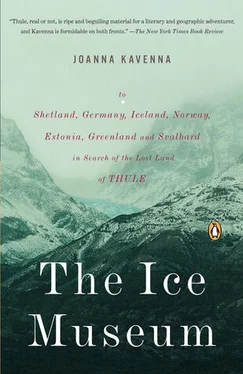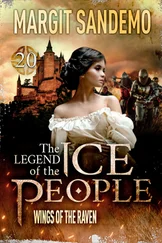Mist, sea and land, a frozen ocean, a midnight sun in the summer, a twilight sky throughout the winter. Pytheas’s account of his journey was lost, and no one could decide where Thule might have been. It left the story of Thule as a glimpse of a distant land. It was an empty page, its silent rocks inviting interpretation. Gradually, through countless verses and learned hypotheses, Thule became a symbol of remoteness, of the shadowy world of the north. Nothing could be known for certain about Thule, and so the word was drawn into imaginative histories, poems, novels and explorers’ accounts. It was worshipped and parodied, cited in stanzas and used for rhetorical phrases. Thule was entwined with thousands of years of fantasies about what might lie beyond the edges of the maps. As the maps came to cover the world, Thule was bound up with the crusades of modern exploration.
In the nineteenth and early twentieth centuries, as more and more travellers set off for the remote north, Thule recurred in explorers’ accounts: Fridtjof Nansen from Norway, Richard Burton from Britain, Vilhjalmur Stefansson from Canada, Knud Rasmussen from Denmark all sounded the cry Thule, as they travelled across the Arctic. Imaginative explorers filled in the blank moment of arrival with a devout incantation. Where the ice stretched away, and the birds plunged and dived, crying into the cold air, the explorers remembered Thule, pinning the word to the empty wilderness.
I found Thule as a curious footnote, a detail that enticed me. I was working in an office in London, dreaming of escaping the city. The crowds were grinding me down; it was a common complaint, but I found I could hardly board a tube. I had lost the will to push myself forward, and as spring broke across the grey-fronted houses I knew I had to leave. I was not vehemently anti-city; in the evenings when the crowds had become more shambling and slow-paced I liked to wander through the centre, from the South Bank to the City, along the Strand, past the fractured façades of the old buildings. I liked the incongruous noises outside my window in the mornings—a solitary bird trilling like a soloist, above an accompaniment of cars and trains. At weekends I sat in parks, reading the papers, staring at the city shimmering under smog. But I was tired of standing in an endless sea of people. I wanted to walk through empty serenity and hear nothing but the thump of my feet on the rocks.
I knew about the idea of Thule from earlier reading. I remembered it as a plain white place, a land that was startling and strange. But I hadn’t known there was a US air base called Thule, and it was this that set me thinking about the far north. Thule Air Base was in northern Greenland, and had been a staging post for nuclear bombers during the Cold War. It was—when I read the article—being upgraded, as part of America’s new missile defence system. It had seen off one threat, the threat of war between the USSR and the USA, and now it was part of a new sense of security concerns. Thule Air Base was the most northerly listening post of a vast military empire. A military base called Thule, nuclear bombers in the remote north, military waste spreading across the silent ice. It was a potent idea; it intrigued me as I read. I thought of this camp, at nearly eighty degrees north, in the most northerly land in the world.
It was around that time that I regained an earlier obsession with polar exploration. It was an old interest of mine; I had always enjoyed an Arctic saga, but I began to buy them in bulk. There was something about the starkness of life in the snow, the terrible risks of travelling across ice plains, that seemed to supply a release from the sameness of my days, the relentless round of my hours. Leafing through explorers’ accounts, I read about Thule again. The old fantasy of a remote northern land appeared in a book by the Norwegian explorer Fridtjof Nansen, the story of his attempt to reach the North Pole in 1893. As a way to draw the reader in, to emphasize the significance of his journey, its place in polar history, Nansen added Thule to the narrative. For Nansen, Thule meant the grandeur of the ice, the pure beauty of the northern landscape. It was a land obscured by mists, standing somewhere in the northern ocean.
Each day, I took another explorer into the packed carriages, flicking through another attempt to shade in a few more blanks on the maps. My mounting fascination supplied a sense of purpose, something I had lost in my dislocated progress round the city. I thought of plains of ice, snowscapes and glaciers shining under a pale sun. As the crowds swelled into the underground, I thought of emptiness, barren rocks washed by a clear blue sea, the long shanks of ancient mountains. I had travelled and lived in the far north; I knew that the ragged mountains and cold fjords still supplied the consolations of a perfect view, the tranquillity of slowness, and I longed to set out for them.
On this theme of Thule, I started compiling notes, scribbling down quotations as I read through books. A long line of philosophers, poets, advocates and detractors referred fleetingly to Thule, from Boethius to Percy Bysshe Shelley. Mostly they cast it in a cameo, adding the word to a line of their prose or verse, using it to evoke pallor and the north. Alexander Pope wrote a slapstick interlude in “The Dunciad,” in which a fire was extinguished with a dank and clammy page of a poem about Thule. Charlotte Brontë put Thule into a gothic scene, as Jane Eyre sits, abandoned by her relatives, dreaming alone on a rain-drenched afternoon. She is reading a book about the Arctic; a reference to the lonely rocks of Thule sets her off into a wild transport, as she conjures the bleak shores of Lapland, Siberia, Spitsbergen, Nova Zembla, Iceland, Greenland, with ‘the vast sweep of the Arctic Zone, and those forlorn regions of dreary space,—that reservoir of frost and snow, where firm fields of ice, the accumulation of centuries of winters, glazed in Alpine heights above heights, surround the Pole, and concentre the multiplied rigors of extreme cold.’ Thule was the symbol for all of this, Brontë thought, all these dreams of beauty and fears of desolation. From Julius Caesar to Edgar Allan Poe, Thule suggested cold silent plains, the blank spaces of the remote northern lands, awaiting discovery and interpretation. ‘. . . To the west, to Hesperian darkness, and the shores of barbarian Thule,’ wrote William Godwin, in Caleb Williams . ‘A wild weird clime,’ Edgar Allan Poe called it, a land on the way to night, a strange unworldly place.
Thule appeared in fairytales, in children’s fables. Through the years, a complete cast of fantasy Thulean inhabitants appeared in verse: there was a ‘King of Thule,’ a ‘Lord Archbishop of Thule’ who preached to ‘elfin legions,’ there were ‘children of wild Thule’ who lived in the deep caves of the northern sea, and there was the Queen of Bubbles living in her caves on the coast of Thule. Thule came to stand in for anything superlative, any finest example of its type. So e e cummings wrote of the ‘Ultima Thule of plumbing,’ and Cecil Day Lewis wrote of trains drawing out from a terminus, ‘snorting towards an Ultima Thule.’ It could be anywhere remote, so Thomas Hardy talked about Thule as the geographical antithesis of London, and Anthony Trollope described Penzance as ‘your very Ultima Thule.’ By then, Thule was so hoary and established that you could play with it, laugh a little at its antiquity and resonance.
In the twentieth century, Thule told a changing story. For thousands of years, no one had known what lay in the ice around the North Pole. During the twentieth century the most northerly places had been mapped and seen, a slow line of explorers with sledges and planes had arrived onto the ice. Lands draped in shadows for thousands of years had been drawn into the light. Fantasy had been replaced by knowledge. It was a desperate struggle, filled with uncertainty. For generations it was thought that the American Robert Peary had been the first man to reach the North Pole by land, arriving there in 1909. Later, Peary’s account was questioned: his skiing was too fast; his diary had perhaps been doctored. In 1926, the Norwegian Roald Amundsen, with his companions Lincoln Ellsworth and Umberto Nobile, flew above the Arctic ice in an airship, dropping flags onto the North Pole. They saw the Pole, but they didn’t land on the ice. In 1948, a Russian expedition, led by Alexander Kuznetsov, landed an aircraft and walked the last steps to the North Pole. If Peary’s detractors were right, Kuznetsov’s team would have been the first to stand at the Pole, fifty years after Nansen had come home. And if Peary had never arrived, it would have been as late as 1969 that the first overland ski and sledge expedition reached the Pole, led by a British explorer, Wally Herbert. It was in the same year that Neil Armstrong walked on the moon. The northerly regions remained distant and inaccessible throughout most of the twentieth century, even as the focus turned to space travel.
Читать дальше












